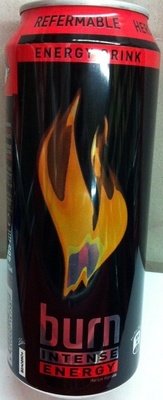Burn Intense Energy - 250 ml
This product page is not complete. You can help to complete it by editing it and adding more data from the photos we have, or by taking more photos using the app for Android or iPhone/iPad. Thank you!
×
Barcode: 5449000147387 (EAN / EAN-13)
Common name: Boisson énergisante
Quantity: 250 ml
Packaging: Metal, Can, Drink can
Brands: Burn
Categories: Beverages, Carbonated drinks, Sodas, Energy drinks, Sweetened beverages
Stores: Auchan
Matching with your preferences
Environment
Packaging
Transportation
Report a problem
Data sources
Product added on by lilimarti
Last edit of product page on by packbot.
Product page also edited by arthurlutz, beniben, malojisiel, manu1400, morganesh, quechoisir, scanbot, stephane, tacite.
If the data is incomplete or incorrect, you can complete or correct it by editing this page.










